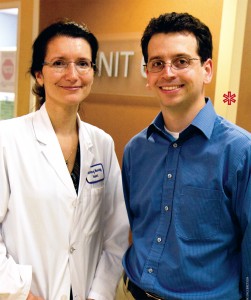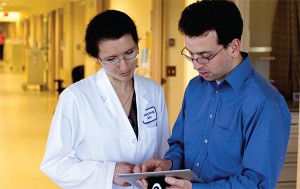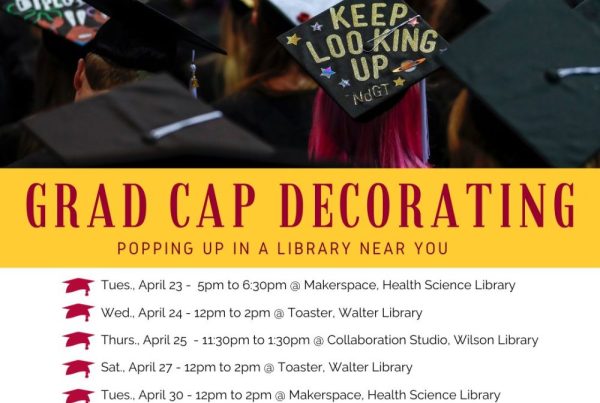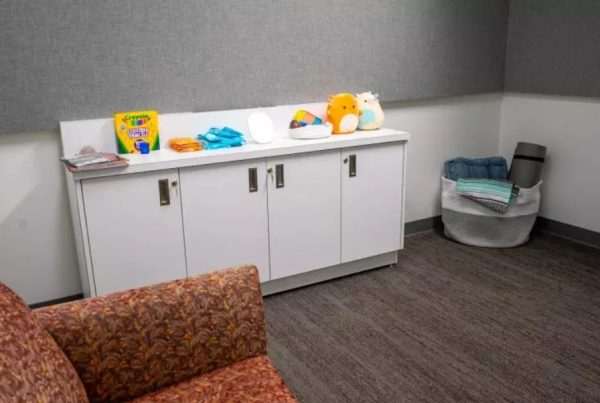By Erinn Aspinall
Jonathan Koffel developed a deep love of books and history as a classical languages major in college. He went to library school with visions of becoming a rare books librarian, spending his time surrounded by hand sewn books bound in sheepskin.
But then he was offered the chance to work in a health sciences library during graduate school. He found himself drawn to an environment where he could collaborate with faculty and students to answer real-world questions about health — questions that had direct impact and value.
He saw that health sciences libraries were at the leading edge of technology integration with their use of online journals, evidence-based practice databases, and support for mobile devices. He has never looked back.
New job, new opportunities
“I knew as soon as I started that I wanted to get involved with patient care since it provided an opportunity to get providers the information they needed, when they needed it, so it could do the most good,” said Koffel, who joined the University of Minnesota Bio-Medical Library as a Clinical Information Librarian in 2011.
This inspiration helped Koffel make quick and strong connections within the University of Minnesota Medical School. After a few initial meetings, he was invited by the Neurology Residency Director, Dr. Ezgi Tiryaki, to attend patient rounds and support evidence-based practice in the department.
“I feel very lucky that he enthusiastically agreed to support us in our graduate medical education efforts,” Tiryaki said. “Knowledge and information in the neurosciences is growing exponentially and it is an essential skill for our trainees to be able to seek relevant information and apply it to the care of their patients.”
Tiryaki’s invitation to Koffel was soon followed by an offer to attend the internal medicine morning report at the Veterans Affairs (VA) Hospital in Minneapolis, where he now contributes to the review of patient cases.
In fact, much of Koffel’s time is spent outside the library, meeting health providers where they work and answering questions in the context of the patient-care setting.
Providing evidence
Over the last three years, Koffel’s work has exemplified how health sciences librarians can be successful contributors to the patient-care team. At morning report, for example, Koffel works with the residents to provide evidence as they seek answers to their clinical questions.
“During a recent morning report at the VA, the chief resident let me know that the presented case would be about an older man with an irregular heartbeat (atrial flutter) and an inflamed gallbladder (cholecystitis),” said Koffel. “He laid out a few potential questions that might come up. When we discussed the case with the residents, however, the most pressing question the residents had (immediate vs. delayed surgery for cholecystitis) was very different from what the chief resident had envisioned,” he said.
With the question in hand, Koffel stepped up to the projector and took the lead, bringing confidence in his knowledge of library resources and his skills for finding and evaluating evidence-based information.
“I talked about looking at synthesized sources and searching the primary literature,” Koffel said. “I then guided the residents through the search process, encouraging them to talk about what they would have done and providing feedback. In the end, we were able to narrow our research efforts down to a single article, which one of the residents will review, critically appraise, and present back in a couple of weeks.”
Supporting patient care
Koffel is also making a difference at the point of care when he joins the neurology residents during patient rounds. After reviewing patient cases and answering initial questions, Koffel closes his laptop and pulls out his iPad as he and the residents move from room to room, visiting patients. As they walk, he continues to look up information to answer a difficult question or to find answers to new questions that arise.
“All too often, we as librarians are divorced from the people we help with our searches and from the context in which they arise,” said Koffel. “Here I get the whole picture.”
Tiryaki said that Koffel’s participation is invaluable.
“Having Jonathan work with residents during inpatient rounds allows them to access information at the point of care and immediately inform their decision making and care plan,” she said. “Embedded in this experience is the fact that Jonathan not only role models best practices but teaches efficiency and sophistication in using the library and other information resources for clinicians.”
Lasting impact
In his role, Koffel is not only supporting informed patient care, he is making a lasting impact on the education of the next generation of health care providers.
Based on Koffel’s contributions to morning report at the VA, he was invited to help teach and attend a series of lectures focused on evidence-based medicine topics. In addition, the morning report format was directly changed based on Koffel’s feedback to provide a greater emphasis on finding evidence and creating a more informal environment.
His contributions also provide the University of Minnesota’s neurology residents with a unique learning experience, Tiryaki said.
“Jonathan has been an invaluable expert and adviser to our residents in scholarly projects such as publishing an e-book version of our residency survival guide,” she said. “Thanks to his contributions and efforts, the University of Minnesota neurology residency stands out in the ability to give trainees this unique, inter-professional learning experience.”
Looking forward
Koffel’s work at the VA and with the Department of Neurology continues to inspire him. He looks forward to becoming more involved with evidence-based practice instruction within the Medical School. He sees a role for a clinical librarian in journal clubs, keeping discussions lively and informative. And he would like to go on patient rounds with more departments and to work directly with faculty to build skills related to finding evidence and supporting informed decision-making.
It is true that Koffel can still quote from classical literature, but now his love of the ancient world is shared with a love for finding the most relevant, up-to-date information to support evidence-based practice and patient care. He said he wouldn’t want it any other way.
Koffel’s innovative work expands beyond his role as part of the patient-care team. Through his collaboration with the University of Minnesota Medical Center, he has teamed with a radiologist, Dr. Daniel Steinberger, to create a groundbreaking radiology report that has the potential to change current practice.
This report includes enhanced imaging and improved communication channels. Most importantly, the report provides links from the concepts presented in the images to relevant evidence from the literature — this is where Koffel’s expertise has proven essential.
“Jonathan helped make our project vision a reality,” said Steinberger. “His input was critical in selecting, organizing, and displaying the best information to include in our enhanced radiology reports.”
The hard work of Steinberger, Koffel, and their colleagues was validated when both the Mayo Clinic and University of Minnesota Physicians agreed to fund Evidentia Health, the company that will put their research into production.






